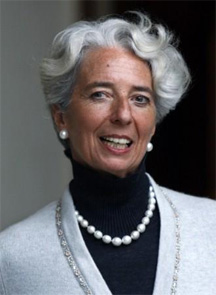WASHINGTON, (Reuters) – French Finance Minister Christine Lagarde yesterday clinched the top job at the IMF, keeping the international lender in the hands of a European at a time of growing concern over a possible Greek debt default.

Lagarde, who starts her five-year term as managing director on July 5, will find herself immediately immersed in efforts by the IMF and European Union to head off a Greek default that could touch off an international crisis.
Minutes after her appointment, Lagarde pressed Greece to move quickly to push through unpopular austerity measures that the IMF and EU say are a prerequisite for further aid.
“If I have one message tonight about Greece, it is to call on the Greek political opposition to support the party that is currently in power in a spirit of national unity,” she told TF1 television.
Global stocks rose and the euro rallied as financial markets grew increasingly confident Greece’s parliament would approve the five-year austerity program this week, which would unleash a 12 billion euro aid tranche from the IMF and EU. Read more at
Lagarde, 55, the first woman to head the IMF, succeeds Dominique Strauss-Kahn, who resigned from the IMF in May to defend himself against charges of sexual assault against a New York hotel maid. He denies the charges.
Her skills as a tough negotiator with a reputation for sealing deals under pressure will carry weight as she moves from defending France’s economic interests to overseeing a global institution that must be seen as a neutral player around the world. Read more at
The succession race was one of the most hotly contested in IMF history as emerging market nations expressed displeasure with the 64-year tradition of having a European head the IMF and an American lead its sister institution, the World Bank.
In a Financial Times blog post, Mohamed El-Erian, chief executive of Pimco, the world’s largest bond investor, said Lagarde would need to show the IMF’s efforts to help distressed European countries were not politically motivated.
He said she would need to prepare for the possibility the IMF could face losses from the large bailout loans it made in recent years, including 30 billion euros for Greece.
Lagarde must also show a commitment to meritocracy by eliminating some nationality-based appointments, El-Erian added, citing the No.2 position at the fund which traditionally goes to an American.
Washington is already considering naming White House advisor David Lipton to succeed John Lipsky as IMF second in command at the end of August, according to sources close to the discussions. For story, see
FINDING CONSENSUS
Lagarde’s selection over Mexico’s Central Bank Governor Agustin Carstens was assured after the United States made its support clear, and emerging market economies China, Brazil, India and Russia did the same.
French President Nicolas Sarkozy called the news of Lagarde’s appointment “a victory for France.”
